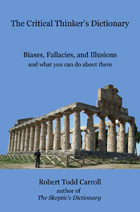From Abracadabra to Zombies | View All
wishful thinking
Wishful thinking is interpreting facts, reports, events, perceptions, etc., according to what one would like to be the case rather than according to the actual evidence. Wishful thinking should not be confused with positive thinking, which, in its most absurd form, is trying to make things happen by willing them to happen.
See also communal reinforcement, confirmation bias,self-deception, subjective validation, and testimonials.
further reading
books and articles
Fingarette, Henry. Self-Deception (University of California Press, 2000).
Kruger, Justin and David Dunning. "Unskilled and Unaware of It: How Difficulties in Recognizing One's Own Incompetence Lead to Inflated Self-Assessments," Journal of Personality and Social Psychology December 1999 Vol. 77, No. 6, 1121-1134.
Mele, Alfred R. Self-Deception Unmasked (Princeton University Press 2001).
Wiseman, Richard. Deception & Self-Deception: Investigating Psychics (Prometheus, 1997).
websites
Self-deception bibliography (from the Consciousness in the Natural World Project)
Unskilled and Unaware of It: How Difficulties in Recognizing One's Own Incompetence Lead to Inflated Self-Assessments by Justin Kruger and David Dunning, Department of Psychology, Cornell University
Recommendations of the Commission on Professional Self Regulation in Science


